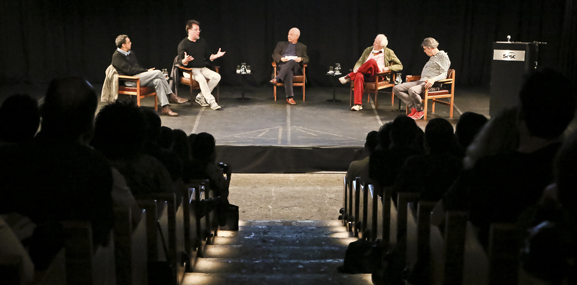“Video, like the mobile phone, is an instrument of change”
In the meeting “Anything can be a television show,” held on Wednesday, October 16 at the Sesc Pompeia Theatre, Zé Celso, Tadeu Jungle, Pedro Vieira and Walter Silveira, former members of the TVDO collective – one of the 1980s audio visual language pioneers –, discussed the context in which they began experimenting with video, and how their work related to TV during the re-democratization of Brazil. “Everything was under debate in the country. Everything plunged into a crisis. Everything was in want of renewal. And audiovisual language was a part of it,” said Gabriel Priolli, the mediator of the meeting that kicked off the 18th Festival Sesc_Videobrasil, featuring Danilo Miranda, the regional director of Sesc São Paulo, and Solange Farkas, the Festival’s director and curator.
"At that time, they wanted to stop [the TV show] Fábrica do Som from being recorded at Sesc Pompeia,” Danilo Miranda said to Tadeu Jungle and Pedro Vieira, respectively presenter and director of the show that introduced groups like Titãs and Ira, among so many others. “They used to tell me that undesirable people used to come to the show, and that in order to get inside people would climb onto the roof, jump the walls... I said, 'that’s great!', because that was exactly what we wanted: something daring, different, innovative, something that would attract new people. Until this day, Fábrica do Som remains one of the most important cultural events São Paulo has witnessed,” said the regional director of Sesc, who co-promoted this meeting of Brazilian video pioneers.
To battle repression, Zé Celso used video as a form of expression
A theatre director who was persecuted and censored by the AI-5 (Institutional Act #5), Zé Celso recollected that in the face of dictatorial repression, which rendered him unable to express anything in his work, video was a way to break through a barrier of silence. In the 70s, while travelling with plays, the director used to film them. “Back then, whenever we shot videos, people would get scared,” Zé Celso said.
The guests also recounted other experiences from those days, like the emergence of music videos, in 1981, the arrival of MTV in Brazil, and the TV shows Mocidade (by Walter Clark), Perdidos na Noite (featuring Faustão) and Cassino do Chacrinha, whose presenter Chacrinha was admired by all for his anarchical character. “Antônio Abujamra, Zé Celso, Glauber Rocha and Chacrinha! That was the genesis of experimental video production in the 80s in Brazil,” said Tadeu Jungle.
Videobrasil: a space for video
Within this context, according to the guests, the first edition of the Videobrasil Festival, in 1983, brought different groups and creators together; it provided a space for them to publicize what they were producing. “We used to criticize because it was a way to get publicity. There was no space (before Videobrasil). And space was a widely used word at that time. There was no way to see other people’s works, no cable TV, nothing,” said Jungle.
The Festival’s creator and curator, Solange Farkas, said that showing one’s production back then was “almost like a David-versus-Goliath affair,” and that combining artistic, political, social and historical aspects has always been the goal of the Festival. Danilo Miranda claimed the partnership has happened because the mission of both Sesc and Videobrasil is “giving a chance to what’s new, pouring salt in the wound.”
Before the debate, excerpts were shown from the videos Caderneta de campo (1983), by Zé Celso; Frau (1984), by Isa Castro and TV Tudo; Heróis da Decadêns(i)a (1987), by Tadeu and Duelo dos Deuses (1988), by Pedro Vieira. The films will be screened in their entirety during the Festival, due to open November 6 at Sesc Pompeia and CineSesc.
Next Meeting: Fernando Meirelles and Marcelo Tas invade TV
“We were the Rolling Stones,” said Tadeu Jungle, referring to the group that attended yesterday’s meeting, former members of the TVDO collective, formed when they were students at the School of Communications and Arts of the University of São Paulo (ECA/USP). His quip was meant to set them apart from the other group that started making video at that time, Olhar Eletrônico, composed of Fernando Meirelles, Marcelo Tas and Marcelo Machado, among others. “They were the Beatles,” said Jungle. The trio, plus the journalist Goulart de Andrade, will participate in the second meeting, where they will discuss Experimental Practices in 80s Video, under the theme “Invading TV.” The event will be held this Thursday, 10.17, at 8:00 pm, at the Sesc Pompeia Theatre. Tickets must be collected at the unit’s box office, 1 hour prior to the start of the event.
The two meetings of Brazilian video pioneers mark the launch of the Public Programs, an integral part of the 18th Contemporary Art Festival Sesc_Videobrasil, which opens officially on November 6 this year and closes on February 2, 2014. The Public Programs’ activities will span the duration of the Festival, involving over 60 guests, including curators, artists and scholars, and comprising eight different focuses: Counter-TV: experimental practices in 80s video; 18th Festival: vectors and inflections; Art research residencies and routes; Performance in three moments; The south in perspective; Reflections in displacement; Superimposed readings; and In the light of 30 years.
Canal VB: Watch testimonies by Zé Celso, Tadeu Jungle and Walter Silveira, in which they discuss their practices in video and the video art scene in Brazil created by Videobrasil since the 1980's.



